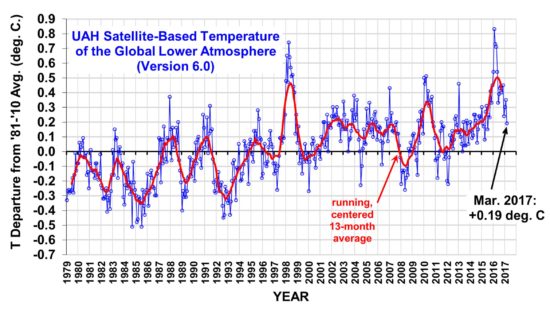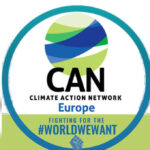
Onder de middelpuntvliedende krachten binnen de EU, zoals de Brexit, het vluchtelingenvraagstuk en de Euro, behoren ook de CO2-reductiedoelstellingen te worden genoemd. Deze worden door het uittredende VK en Polen als een toenemend knellend korset ervaren. Beide landen proberen zich onder de eerder gemaakte afspraken uit te wurmen. Polen wordt hierin gesteund door zijn Visegrad-partners.
Onder de titel, ‘UK looking to renege on climate goals post-Brexit – reports’, rapporteerde Ian Clover voor ‘PV Magazine’:
The British government is assessing ways to scrap pledges made to hit 2020 clean energy targets without incurring any penalties, reports Bloomberg, in a first sign of the country reneging on mandatory environmental action made under EU membership.
The U.K.’s treasury and business department is seeking ways to scrap the country’s binding EU target of sourcing 15% of its energy from renewable sources by 2020, reports Bloomberg.
Citing an anonymous individual with knowledge of the matter, Bloomberg says that officials are hopeful that a post-Brexit Britain can avoid the fines and penalties associated with missing its EU target if they can find ways to abandon the goal – a goal that the country is unlikely to hit either way.
Fines could run into the tens of millions, and officials believe that rather than fall short and face the penalty, the far easier option for Brexit Britain is to take its foot off the clean energy accelerator, rather than press ahead with scaling up investment in wind and solar power.
If the U.K. is successful in wriggling out of its obligations, it would be another tangible sign that the country is increasingly out of step with the majority of mainland Europe. …
According to the National Grid, the U.K. will hit 15% renewable penetration no earlier than 2022 based on current projections. The wider 2030 goal agreed by the EU at the COP21 summit in Paris in 2015 is also in doubt from a British perspective, with the government official revealing that the country wishes to “avoid further constraints on its energy mix stemming from the EU”.
Lees verder hier.
Het VK was, net als Nederland, in het verleden een van de meest fervente voorstanders van een ambitieus Europese CO2-reductiebeleid. Daar komt nu de klad in. Het laaghangend fruit is geplukt en additionele inspanningen op dat terrein gaan hoe langer hoe meer pijn doen.
Vanwege hun grote afhankelijkheid van steenkool was er geen laaghangend fruit in Polen en andere Visegrad-landen te plukken. Zij hebben zich dan ook voortdurend tegen de aanscherping van het Europese CO2-reductiebeleid verzet. Daar is tot op heden weinig ruchtbaarheid aan gegeven. Het is met de Europese mantel der liefde bedekt. Maar de laatste tijd zijn de breuklijnen duidelijker aan de oppervlakte gekomen.
Onder de titel, ‘Poland not agree with introduced EU climate norms: PM’ rapporteerde ‘Global Times’.
Poland doesn’t agree with the introduced European Union (EU) climate policy norms, Polish Prime Minister Beata Szydlo announced Wednesday.
“As for climate policy, our position is clear: we do not agree with the norms that have been introduced. We will be consistent in protesting and looking for new solutions,” Szydlo said.
She made the remarks at a press conference when asked about Poland’s strategy towards the EU climate directive, considering that the country’s power industry is based mainly on coal.
Szydlo referred to an amendment to the National Emission Ceilings Directive (NEC) that aimed at reducing emissions from industry, traffic, power plants and agriculture. National emission commitments concern the period after 2020, but targets after year 2030 are also set.
The prime minister added that the EU climate norms were not only a problem to the Polish economy but to the other central European countries as well. “We will protect our economy,” Szydlo said.
Asked about her statement that she was immune to “blackmail and pressure, which are also used in Brussels,” Szydlo explained that she was talking about a pressure in the EU, a good example of which were the climate solutions. She said that according to the treaties, the solidarity within the EU should be respected and interests of every country, not just the strongest ones, should be taken into consideration. …
Lees verder hier.
De Polen staan bekend als harde onderhandelaars, zeker wanneer het hun vitale (energie)belangen betreft. Het is dus weinig waarschijnlijk dat zij zullen inbinden. De Britse beleidswending en Poolse vastberadenheid (gesteund door de andere Visegrad-landen) zullen de druk op de cohesie van het Europese CO2-reductiebeleid verhogen.
Deze ontwikkelingen op het inter-Europese diplomatieke vlak, de groeiende twijfel binnen de wetenschap over het temperatuurverhogend effect van CO2, alsmede het uitblijven van statistisch significante opwarming sinds 1998 (de afgelopen maanden is de gemiddelde wereldtemperatuur met ongeveer 0,65 graden C gedaald!),

zouden de komende jaren wel eens tot het uiteenvallen van het Europese klimaatbeleid kunnen leiden. Daarmee zou de EU dan een voorbeeld nemen aan het klimaatbeleid van de regering Trump, en niet andersom.
Climategate.nl! Onthullend over nieuwsfeiten die nog niet hebben plaatsgevonden (grapje)!
Voor mijn eerdere bijdragen over klimaat en aanverwante zaken zie hier, hier, hier, hier en hier.






even Off Topic: kan iemand mij de typische kosten van een kolencentrale geven?
https://wijwillenhemweg.nl/crowdfunding
Ik vroeg me namelijk af hoeveel je nodig hebt om de Hemweg kolencentrale te kopen. De initiatiefnemers hebben nu 5 miljoen, dat leek me weinig, maar anderzijds, misschien is de centrale al afgeschreven en is Nuon bereid de centrale te verkopen.
Ik heb echter totaal geen idee.
HB
Nuon: Hemwegcentrale heeft waarde van 250 mln
https://www.nrc.nl/nieuws/2017/03/27/nuon-hemwegcentrale-heeft-waarde-van-250-mln-7590229-a1552065
Men moet wat langer sparen ;-)
er is het verschil tussen waarde en prijs …
en het is 100% Warren Buffett om iets dat (veel) waarde heeft aan een (zeer) lage prijs te kopen …
ik zou het dus blijven volgen ! … en misschien al een bod doen van 5M€ ! … :-)
maar het is nog vroeg imho … zowel wat de “positieve” waarde van zon en wind lijkt (i.e. de EU zet zich er nog volop achter, dus er is nog altijd iets mee te verdienen ..) als wat de “negatieve” waarde van thermische centrales lijkt (die hebben we helemaal niet meer nodig, want kijk eens wat een capaciteit aan wind en zon wordt geïnstalleerd, en een MW is toch een MW niet ?…)
( ondertussen houdt een Tjechische onderneming – maar ik vind niet direct de naam terug – zich al bezig met het opkopen van surplus thermische capaciteit … blijkbaar zijn zij van mening dat we die binnenkort misschien nog wel nodig zouden kunnen hebben … )
“en een MW is toch een MW niet ?”
Ja, maar het is geïnstalleerd vermogen, capaciteit dus. “Hernieuwbare” zonne- en windenergie is weer- en dag/nachtgevoelig; vandaar de wisselvallige opbrengt.
@ Boels …
op die EU summit waarover ik hieronder sprak waren de panelleden daarvan NIET op de hoogte …
noch van het verschil tussen “renewable electricity” en “renewable energy” … beide zijn immers “RE” …
De Amsterdamse trams zijn voorzien van het opschrift “wij rijden op groene stroom” .
Waar zou die stroom vandaan komen beneden windkracht 5?
Precies: biomassa, die levert (volgens het CBS) 70% van alle “hernieuwbare” energie.
In Nederlandse gemeenten is verhoogde houtkap waarneembaar.
Een beter opschrift voor de trams zou dus zijn: “wij slopen de bossen en vernietigen de habitat van dieren” .
Zo wordt je klaar gemaakt voor de groene wereld ;-)
Pure indoctrinatie.
ziehier waar de meeste groene stroom vandaan komt:
http://www.davdata.nl/groenestroom.html
ik was 2 weken terug op de “3rd EU Energy Summit”, zeg maar in het hart van het Europese deel van de Swamp …
en het verschil daar tussen de meningen van vertegenwoordigers van Oost en West Europa (inclusief Spanje en Italië) was enorm … niet uit te klaren op korte (of misschien zelfs middellange) termijn …
Oost Europa vroeg tijd om hun economie annex energie aan te passen, terwijl West Europa, bij monde van o.a. Mr. D. Ristori, Mr. C. Moedas, Mevr. M. Wörsdörfer, vooral en snel de wereld wilde redden van de imminente klimaatcatastrofe, want daarvoor hadden “we” ons in Parijs geëngageerd …
Tekenend voor de eenheid in de EU was een vraag uit het publiek van een vertegenwoordiger van een Bulgaarse elektriciteitsproducent … Die had zowel een kolencentrale, als een hoop zonnepanelen en een aantal windmolens om hun klanten te bedienen en warm te houden … Maar tijdens de afgelopen maand januari was er helemaal geen wind, lagen de zonnepanelen onder een meter sneeuw, en kon de producent enkel zijn kolencentrale inzetten …
“Wat moeten wij doen met onze klanten als we binnenkort die kolencentrale moeten sluiten ?” … was dan zijn vraag …
“Qu’ils mangent de la brioche ! ” … was het gevatte antwoord van Mevr. Wörsdörfer daarop …
(wat ze tijdens een tweede tussenkomst, 5 minuten later, gelukkig wel wat nuanceerde …)
Stuitend.
De EU had telkens wanneer een van de voormalige Oostblok landen toetrad moeten zorgen voor een grondig pakket maatregelen en steun om die landen ZSM te laten overstappen van fossiele brandstoffen op kernenergie. Dat is niet gebeurt. Integendeel, het is eerder bemoeilijkt! En nu regent het krokodillentranen. Stuitend.
De EU moet het voortouw nemen met nucleaire research maar moet zich niet met de energievoorziening van individuele landen bemoeien. I.h.a. dient de EU zich te beperken tot grensoverschrijdende zaken.
Energie onderzoek, GPS systemen : daar heeft internationale samenwerking zin.
Wij doen hier compleet overbodige moeite.
Alles wat nodig is is 4 jaartjes studie:
https://saxion.nl/studeren/kiezen_en_kennismaken/Studiekiezer/abrr/ruimtelijke-ontwikkeling/klimaat-en-management
De zoveelste fopstudie waar men na 15 jaar hun studieschuld niet kan terugbetalen omdat ze geen baan hebben gevonden. De klimaat schade wordt steeds groter.
Je kunt er donder op zeggen dat die klimaatmaatregelen -wat een term vol hubris!- ons ook zo zullen knellen dat ook wij, als vele dames van weleer, gebroken ribben zullen oplopen. Het is immers slechts een kwestie van tijd tot de energierekening merkbaar de koopkracht zal aantasten en het korset de adem doet benemen tot de onderste ribben een voor een knappen. Ik mag hopen dat de burger dan eindelijk het bedrog, anders kan ik de informatievoorzienig door Overheid en media niet noemen, zullen beseffen en in opstand komen. De oost Europese landen zijn gelukkig nog niet behekst door het groepsdenken van Noordwest Europa. Het VK begint eindelijk ook het licht te zien. Nu Duitsland nog.
De Oostbloklanden zijn gewend te worden voorgelogen door de overheid. Zijn dus wat alerter op dat punt. Daarom ook het boek “Blauwe planeet in groene kluisters” van Vaclav Klaus.